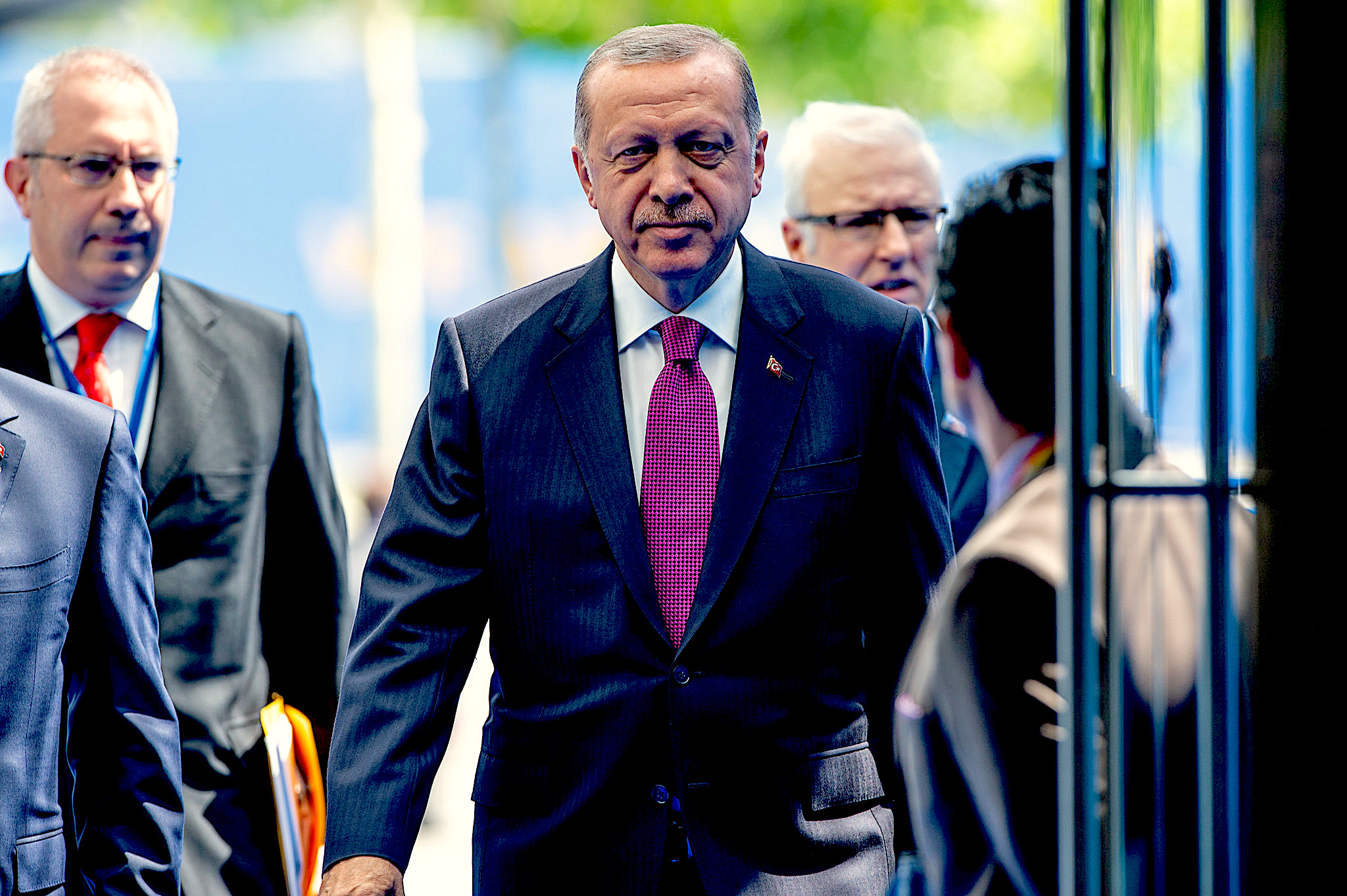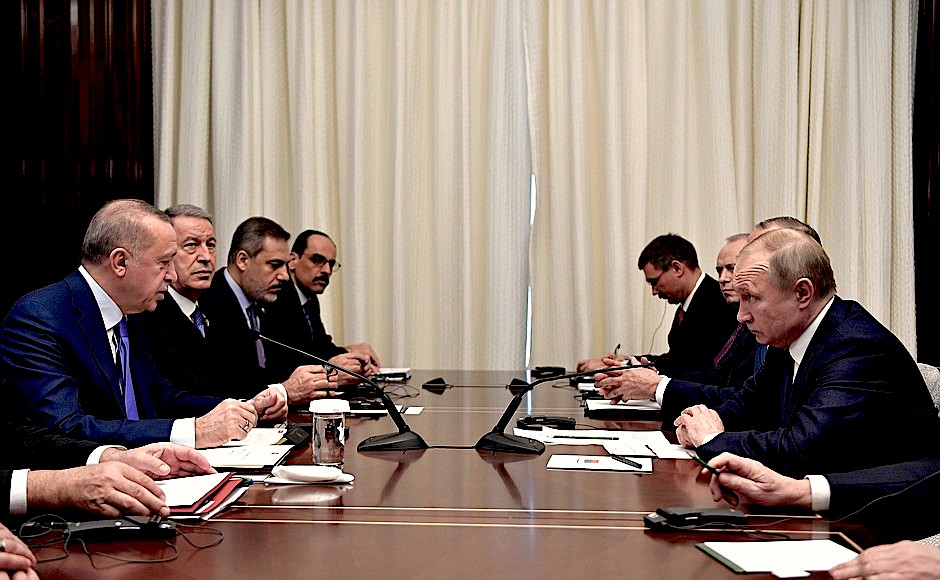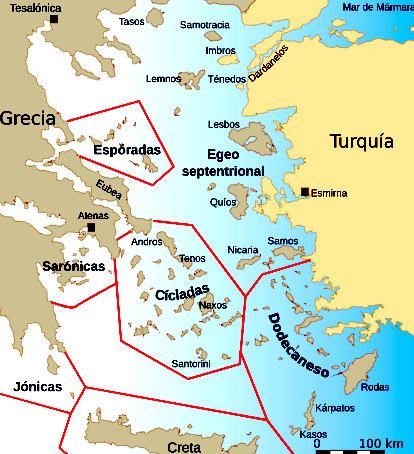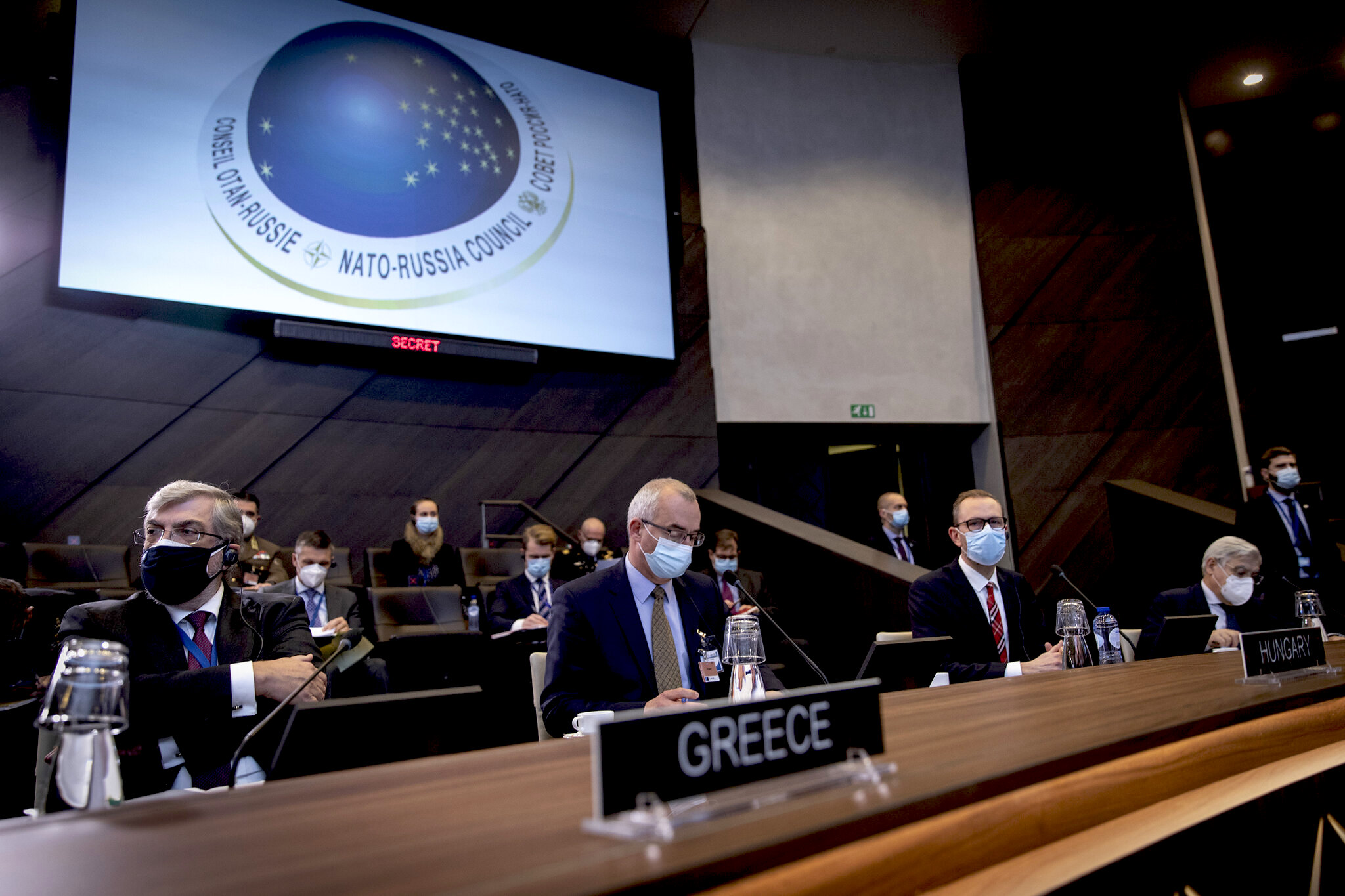Erdogan’s opposition to Swedish and Finnish accession to the military alliance goes beyond those countries’ perceived support for Kurdish resistance groups.

President Recep Erdogan of Turkey arriving for a NATO meeting in 2018. (NATO)
UPDATE: NATO member Turkey on Wednesday blocked an effort to fast-track Finland and Sweden’s membership in the military alliance.
By Craig Murray
CraigMurray.org.uk

Craig Murray.
I am in Turkey because, if there is to be movement in ending the war in Ukraine, it will happen here.
President Recep Erdogan’s firm stance on a potential veto of Swedish and Finnish NATO membership is framed in public only in relation to perceived support by those countries for Kurdish resistance groups. But of course, it goes much deeper.
Erdogan understands that the spectacular advance by NATO eastward that Finnish enlargement in particular would represent, is a slap in the face for Russian President Vladimir Putin that will make a peace deal in Ukraine far more difficult.
Any such deal would have to be based upon Russia giving up some of the Ukrainian territory it holds today. Dramatic NATO expansion is the very opposite of an attempt to create the conditions for that. In fact, that NATO is so actively pursuing this expansion is sufficient evidence that NATO is looking for a long proxy war to bleed Russia, rather than trying to restore peace and stability to Europe.
[Related: Biden Confirms Why the US Needed This War]
That the European public are gripped by a wave of emotion over Ukraine was amply demonstrated by the popular vote of tens of millions in the Eurovision song contest.
Donate to Consortium News‘
2022 Spring Fund Drive
Once the spasm dies down, opinion in Finland and Sweden may revert. It has been obvious for over a decade that Putin has an aim to reintegrate Russian populated areas of the former Soviet Union into the Russian Federation. That agenda is currently causing a ruinous war, but is no military threat to Finland or Sweden.

Turkish President Recep Tayyip Erdogan, left, meeting with Russian President Vladimir Putin in January 2020. (Kremlin, CC BY 4.0, Wikimedia Commons)
Turkey retains the prestige of chosen venue and perhaps broker for continuing diplomatic contact between Russia and Ukraine. Erdogan’s robust stance on Finland and Sweden is necessary to maintain Russian trust.
Turkey of course has its own lengthy and extremely complex historical and current relationship with Russia, which is much more important than Turkey’s role as a key NATO member might suggest. It is also worth bearing in mind that Turkey is a far more serious military power than Finland and Sweden combined.
There is another, specifically Turkish interest in play here, which is very much a factor in Erdogan’s willingness to stand up to U.S. President Joe Biden over Swedish and Finnish NATO entry. This of course relates to the permanent tension between NATO members Turkey and Greece.
Turkey is furious over the militarization of the Eastern Aegean Greek Islands very close to its shores, and the lack of support and understanding it has received from other NATO members over the perceived threat.

Island groups in the Aegean Sea. (Wikid77CC BY-SA 4.0, Wikimedia Commons)
The status of Greece’s most Eastern (Dodecanese) islands is not in doubt. It was established by the Treaty of Paris in 1947, to which all the permanent members of the U.N. security council, and many other states, are parties.
The demilitarization of the islands is unequivocal, and no treaty since has negated it.
Other Greek islands including Limnos and Lesbos slightly further West are similarly constrained by the 1923 Treaty of Lausanne. Greece claims this status was modified subsequently by the 1936 Straits Convention. I don’t think that is right but that is a more complex argument than we need to develop just now. The 1947 Treaty is not modified.
Yet Greece had proceeded and is still proceeding with the militarization of the Dodecanese islands on a large scale, involving tens of thousands of troops in total, military aircraft, and in particular long-range surface-to-surface missiles.

NATO-Russia Council meeting on Jan. 12. Greece’s NATO representative Spiros Lambridis on left. (NATO)
Turkey and Russia both regard these as a threat. The Turkish government are privately convinced that this militarization is being carried out with active United States cooperation, participation and perhaps instigation.
In February, Erdogan stated that as the treaties specifying demilitarization are the very treaties which give sovereignty over the islands to Greece, then if Greece was repudiating the treaties it brought sovereignty into question. Erdogan was immediately slapped down by the Biden administration.
So Turkish resentment at U.S. behavior in the Aegean, seen as encouraging a direct military threat, is another reason why Erdogan is not anxious to defer quickly to the U.S. agenda in the Baltic. Turkish exasperation is further fueled by the fact that this really is bad faith by the U.S., in refusing to abide by an international treaty to which it is a party (a position complicated by Turkey itself not being a party to the Treaty of Paris 1947).
Craig Murray is an author, broadcaster and human rights activist. He was British ambassador to Uzbekistan from August 2002 to October 2004 and rector of the University of Dundee from 2007 to 2010. His coverage is entirely dependent on reader support. Subscriptions to keep this blog going are gratefully received.
This article is from CraigMurray.org.uk.
The views expressed are solely those of the author and may or may not reflect those of Consortium News.
Help Us Beat the Censors!
Donate to Consortium News‘
2022 Spring Fund Drive
Donate securely by credit card or check by clicking the red button:

Is there anyone who is surprised when the United States does not abide by treaties and international law? If so, it must be those who believe that the so-called “rules based order” is international law.
At any rate, it is clear that the US wants this war to go on indefinitely, or at least until the Russian Federation is defeated and defanged. I am reminded of Orwell’s “1984,” in which Oceana is a permanent state of war with Eurasia and Eastasia. They have always been at war. Can anyone argue that this is not what the current leadership of the US wants? When have we not been at war?
“this really is bad faith by the U.S., in refusing to abide by an international treaty to which it is a party”. When does the US act in good faith? When does it ever abide by agreements when it doesn’t want to? Using tired well-worn cliches and rhetoric, it claims the moral high ground all the time, but rarely actually holds it.
My default position is that the US always acts in bad faith. So, I don’t doubt for a moment that the US wants to increase tension between Greece and Turkey, just as it does with so many other countries. It embodies the Roman principle of ‘divide and conquer’ which it uses so effectively around the world to destabilise and disrupt.
Erdogan probably knows this better than most European leaders, most of whom are caught up in the hysteria and madness of Russiaphobia, and have lost what little powers of logic and reasoning they might once have had. He appears to be using this moment to leverage advantage since he knows how embarrassing it will be if NATO (and the US) fails to get Finland & Sweden into NATO.
Your default position is the correct one. The US has never lived up to its treaty obligations in its existence. My (very) late aunt was a descendant of Empire Loyalists who were supposed to have been compensated for land seizure pursuant to the Treaty of Paris 1783. Her family is still waiting.
Craig writes: “It has been obvious for over a decade that Putin has an aim to reintegrate Russian populated areas of the former Soviet Union into the Russian Federation.”
I’d like to see this point discussed in a little more detail.
There is no evidence that Putin aims to reintegrate areas of the former Soviet Union into the Russian Federation. It is part of the western media anti-Russia propaganda, nothing more.
I second this. It would be nice for Craig Murray to provide evidence in support of his claim.
Murray is so right about so much but often shocks me with his inability to see past some of the empire’s talking points.
There is no evidence that Putin aims to reintegrate areas of the former Soviet Union into the Russian Federation. It is part of the western media anti-Russia propaganda, nothing more.
Dear Craig, many thanks for your articles. I believe that there is no majority in Sweden for NATO membership. The Swedish elites appear to have no taste for democracy and no intention of conducting a plebiscite. Swedes no not need to “revert” as they do not wish to be railroaded today.
Thanks for the analysis. I thought Erdogan only wanted $40 billion like non-NATO member Ukraine.
It is a great point that the US is pushing Greece toward another war with Turkey maybe “to the last Greek!”? Maybe the US will try to overthrow Erdogan again as they did in 2016 with Fethullah Gülen? Coups can be more devastating even than invasions, as the US-driven Maidan Coup in Ukraine showed. Puppet states are cheaper than occupations.
There was a time, long ago, that the US had a salutary effect on international politics. So long ago.
Indeed. The behaviour and precedents set by the US for the last 50 years is the main destabilizing force in the world right now.
“It has been obvious for over a decade that Putin has an aim to reintegrate Russian populated areas of the former Soviet Union into the Russian Federation. That agenda is currently causing a ruinous war…”
Craig Murray has proved his courage and integrity, but that doesn’t stop him from turning the truth on its head with respect to Russia’s intervention in Ukraine.
What “has been obvious for over a decade” is the U.S. scheme to use Ukraine as a pawn to undermine Russia’s nuclear deterrence capability, in the process destabilizing the entire planet and perhaps provoking nuclear war.
Assertions like this one by the former ambassador regarding the causes of the war in Ukraine cast the blame squarely where it does not belong. We can’t work toward a just resolution of the war until we understand the real causes.
AlleyCat. I share your views on Murray.. I’m perplexed from where he gets the idea of “Putin has an aim to reintegrate Russian populated areas of the former Soviet Union into the Russian Federation”. I have been following events in Europe/Russia now for many years. Have seen/heard no such evidence to support such wildly unproven fairy story. Though I DO know, the Brits make all sorts of unsubstantiated claims to fulfil their agenda, which is to destroy Putin and Russia, by any means neccesary. It’s amazing that Murray has not read or listened to Putin’s concerns at various public meetings and the U.N. where he has stated, very clearly, what his objectives are. Yet Western people refuse to give creditability to any of his speeches, and instead insert their own (PROJECT) thoughts, ideas, beliefs. I have been hesitent to voice my thoughts on Murray, but from this day forth, that will no longer apply. I consider him to be a turn coat.
Alley Cat: Thank you, I agree. That statement stood out for me too especially because “Putin = crazy, demonic expansionist,” is foundational to the whole house-of-cards edifice of the Western narrative.
In a good article on antiwar.com by Ronald_Enzweiler, he describes Henry Kissinger’s (not a hippy) recent statements on Ukraine, in which he did not see Russia’s invasion of Ukraine as an attempt by Putin to recreated the USSR. However, he said, after the war ends, we are not going back to the previous relationships.
And in the same article, he also refers to Jacques Baud who explains: “NATO’s Cold War mentality has survived the Cold War. It now justifies its existence by creating a confrontation with someone else.” This is why NATO killed Russia’s post Cold War “Partners for Peace” initiative and Russia’s bid to join NATO. [hxxps://original.antiwar.com/Ronald_Enzweiler/2022/05/18/who-misread-whom-in-ukraine-war-debacle/].
I imagine a lot of Westerns are completely unaware of things like this; Russia wanted to join NATO!? That tends to shake the “Putin is Hitler” narrative. OMG, that maniac Putin is planning for peaceful coexistence. How diabolical..!
For myself, I take the joint statement by Russia and China about wanting to establish a laws based international order based on a democratized UN in a multi-polar world a lot more credibly than Blinken or Washington’s statements about Ukraine and NATO.
In that light, Mr. Murray’s comments as you mentioned are not shedding light but making things more opaque, although, again, I’d like to hear why he feels that way.
To understand the real causes we should go back to the early 1920’s and trace the Soviet policies / treatment of Ukraine through the decades. People who claim to know what is going through Putin’s mind are guessing, at best. Who could predict pre-Feb 24 that he would order the Russian bombardment of majority ethnic-Russian cities such as Kharkov, Mariupol and Melitopol? Each of them has at least 60% Russian population while Kharkov is above 70%. What “aim” of Putin’s is accomplished by this?
We have to remind ourselves that everything that happens now, all the intrigues, all the jockeying for position and the betrayals have to be seen in the larger context that both Russia and China are in existential battles for their existence. Ukraine is just the first chapter of WW III with quite a few more to come. The war is for a uni-polar world vs a multi-polar world.
The US has the stated goal of complete global hegemony and if it achieves its goal there will be no countervail to its power.
A multi-polar new world order (NWO) is our ticket to survival– a uni-polar world is is the low road to global fascism .
Graig,
your coverage of Julian Assange’s show trial
brought the UK/US/CIA assault on journalism
to all interested, and now the Israeli murder of
Abu Akleh. When he’s extradited will you and
other journalists give the CIA blowback by revealing
the truth for bringing him here?
Also, as the Ukrainian radical neo-Nazi nationalists
attack Russians in the Donbas, isn’t Putin protecting
them by “reintegrating” them into the former Soviet Union?
And lastly, does the U.S. puppet Zelensky have
the independence to negotiate a peace deal with Russia?
Thanks for all your reporting, especially in defending Julian.
Always appreciate your insight, Mr. Murray! But I think that Putin was being straight with us in is 2/24 speech when he said that he didn’t want to occupy Ukraine and that he was claiming Article 51 standing to act in defense of the two Donbas states that he had just formally recognized. He seemed to be following the Kosovo playbook to the letter. Broadcasts from the area refer to those to republics by their name, while western broadcasts refer to the areas as “Russian held territory”.
I hope there are other people with Erdogan’s guts in Turkey’s halls of power. I shudder at the ruthless, deceitful, conscienceless world that would be left should the rapacious West prevail.
The Russians have been getting “slapped in the face” by the US for some time now; that ultimately is what led to the “Operation” in Ukraine. One wonders whether Sweden and Finland’s leaders have simply lost their minds, and I think Erdogan is right to suspect that the US is behind the provocations in the Dodecaneso. I mean, that’s all the US does at this point.
Thank you for this insight, and your service of good international relations
Turkey is Israeli one day, USA the next, NATO the third and Muslim the next. They are not Russia’s friend and neither China’s. Erdogan plays games and dreams about restoring the Ottoman empire. He just causes trouble and will be fixed one-day.
Russia is winning this war at its own pace and contrary to Western opinions Ukraine will fall apart very soon. Finland and Sweden joining NATO is a joke. It is all part of the threats to intimidate Russia. Nothing is working. The Western standard of living is tanking, soon to become extreme.
If that is what is meant by a ” long war” that is correct. I have absolutely no doubt that Russia has many thousands of ballistic missiles ready and waiting.
So Turkey should just put a big target on its back and endure obliteration in a US war or turn into another European vassal state? No thanks.
So basicly, what your saying is every nation should conceed to the American demands of their World hegemony to avoid becoming a target of their missiles ???? Did such behaviour prevent WW 2 ??????
I believe it’s called “appeasement” ?
“what your saying is every nation should concede to the American demands of their World hegemony to avoid becoming a target of their missiles” – Evidently, this is US Foreign Policy toward Muslim countries under PNAC, regardless of any rhetoric to the contrary.
Are you attributing Churchillian qualities to Erdogan? I see your point, but I doubt you will find many supporters here of that view.
“It has been obvious for over a decade that Putin has an aim to reintegrate Russian populated areas of the former Soviet Union into the Russian Federation. That agenda is currently causing a ruinous war, but is no military threat to Finland or Sweden.”
So according to Crag Murray NATO expansion, the United States withdrawing from 3 Nuclear Treaties, the Unites States placing missile defense systems in Poland, the 2014 coup in Ukraine and the 8 year civil war that followed WERE NOT causes for the military action in Ukraine.
Instead it’s Putin’s desire to put the band back together.
You can take Crag Murray out of the West, but you can’t take Western thinking out of Crag Murray.
My thoughts exactly JoeSixPack.
The world is indeed a complicated place. Behind the scenes deceptions eventually crash on the rocks of reality and harder pushing begets harder pushing back. I can see State Department heads falling off.